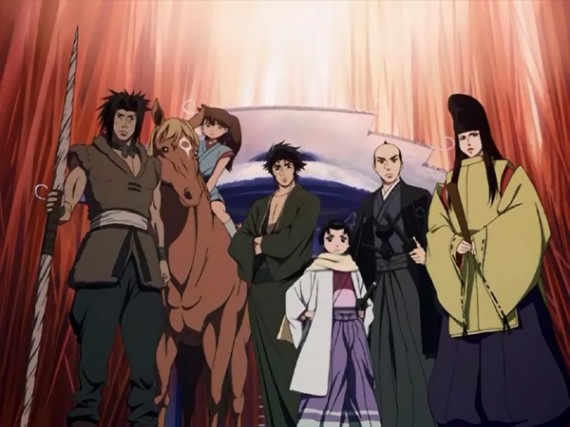For those of you who are intrigued yet mystified by the Casshern trailer… this is my horrible “I’ve taken two whole years of Japanese, golly-gee-wow” attempt at “translating” it.
MAN SPEAKING IN BOARD ROOM: koko ni, hitotsu no seika wo happyo sasete itadakitai. sono nawa, shinzou saibougu.
[here] [one] [product/result] [announce receive/ask to do] [heart/mental image/newly made] [cyborg]
Here, I would like to present to you a product. That is, a new cyborg.
MALE VOICE 2: kore ga…[something? hu?] koko made [something] da na…
[this is] [this far]
What? It’s already come this far? (this is pretty much a guess based on the guy’s tone…)
MALE VOICE 3: okusama, ko-byokidatou wo okishimashita ka.
[Madam] [illness] [occurred]
Madam, have you become ill? (there seems to be a malicious undertone to this. also, it’s spoken very formally)
MALE VOICE 4: runa wa dou surun da.
What is Runa/Luna doing? (not specifically; more like, what is she up to? what’s on her mind? what’s her problem?)
MALE VOICE 5: tomodachi katta dakatte iru no ni jibun dake konnata tokoro ni du(?) wake de wakanai.
[friend][?][?][exist/are (a person/people)][nominalizer particle][directional/purpose particle][self][only][this place][reason] [of] [I don’t know]
(Um…yeah. Your guess is as good as mine.)
LAB TECHNICIAN (or something): geninfume desu!
[cause unknown] [it is]
We don’t know what caused it!
MALE VOICE: shinzou saibo wa mada kansei se no ka?
Isn’t the new cyborg finished yet?! (I’m pretty sure on this one, but I could be wrong)
MAN WITH RED LIGHT ON HIS FACE: dou yuu koto da?
What is the meaning of this?
MALE VOICE: gunbu gan go iteru to yuu koto desu.
[military authority/rural area/county] [frozen]
(These words could really mean too many things for me to even make a good guess. But I think the “frozen” bit must be correct, seeing as there is so much snow in that scene.)
GIRL EMBRACING BOY: naze hito wa tatakau no kana?
I wonder why people go to war… (This might be “So that’s why people go to war…” or something…I’m still sort of unsure about the “kana” form)
WOMAN: anata katta wa. nani wo shita no desu ka?
I found you out! What have you done?! (I’m pretty sure this is it, but I’m still bad about plain form because they leave out lots of particles that could help me figure out what parts of speech words are…also, when she says “anata”, she might be meaning “dear”, as in “my husband”. This is typically how the word is used these days. If that’s the case, then it’s just “I caught you, husband!” or something similar.)
MALE VOICE: shio wa samaru anata wo shinsou ningen to shioshu.
[opportunity][topic particle][?][you][preposition marker][depths/deep level/real] [human][part of speech marker][?]
(This looks something like “I took the opportunity to [do something involving] real humanity”, but who knows…)
MALE VOICE 2 (gasping): ningen wo?
[human] [obj.particle]
To humans?! (or maybe “Humans/humanity [are being ___]?!”)
ICY LOOKING GUY (Casshern?): minagoro shissuto. (sheest?)
(NO CLUE WHATSOEVER! I would like to just guess that he means “I’ll kill everyone”, but I can’t find any evidence for that theory :>)
FRANTIC MAN ON PHONE: kodomo(?) aru(?) no(?) kyu(?) hyaku shiro!
(Some details that probably explain everything. I don’t even know if I transcribed the words correctly ;_;) Quickly!
MALE VOICE (whispered): Hello. (I think, anyway…)
MAN (murmuring to woman): watashi no buwe no tsukutano fifu […?]
(People shouldn’t mutter. ;P Other than “my”, I have no idea what he’s saying.)
KNIGHT-LOOKING GUY (Casshern?): kisama…!
You…! (kisama generally refers to someone you are very unhappy with.)
WHITE-HAIRED MAN: dare da?!
Who are you?! (or “Who is that?!”)
MAN WITH SHINY ROUND THING ON HEAD (Casshern?): ore wa mo ningen ja nain da yo!
I’m not human anymore! (This doesn’t sound like a random statement, but rather he’s saying this in response to something, or as a reason for something)
MALE VOICEOVER: tatta hitotsu no inochi wo sutete, umari kawatta fujimi no karada. tetsu no akuma wa tadaite kudaku. Casshern ga yareneba. Dare ga yuru(?)
[only] [one] [power] [suteru-to abandon/throw away?][buried/surrounded/overflow/filled] [another/different/various/particular/unusual] [immortal] [body] [iron] [demon] [comes?] [break/smash]
Only one power (something), filled another immortal body (???). The iron demon comes to destroy. Casshern can’t be stopped. Who (something)?
So yeah, wasn’t that great? My attempt sure cleared THAT up!!! ^^;;; If anyone has a real clue, be sure to leave a comment or send me an email and let me know.
![]() Sean and I recently went back to Tenpou Ibun Ayakashi Ayashi, a show I started watching via fansubs in 2006 but never got around to finishing. Now the whole series is on Crunchyroll.
Sean and I recently went back to Tenpou Ibun Ayakashi Ayashi, a show I started watching via fansubs in 2006 but never got around to finishing. Now the whole series is on Crunchyroll.